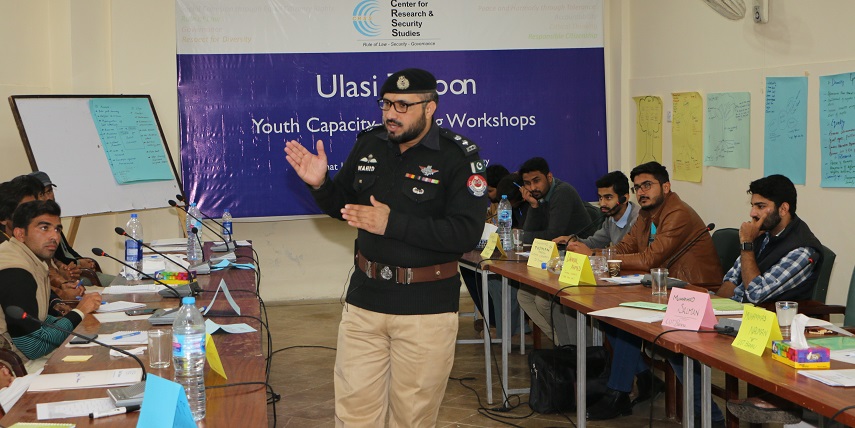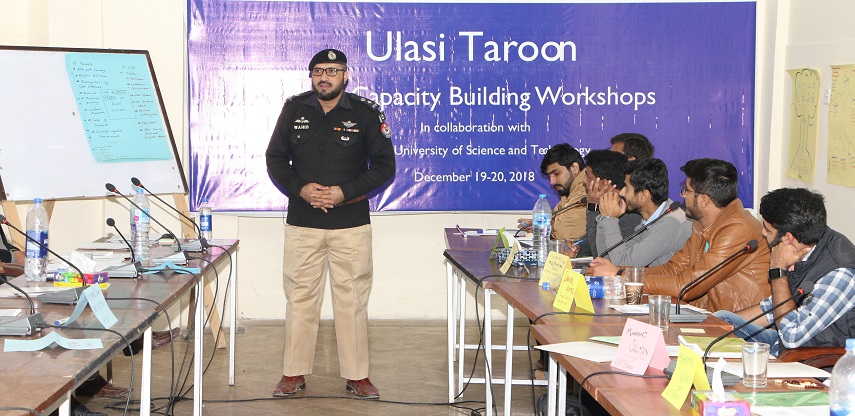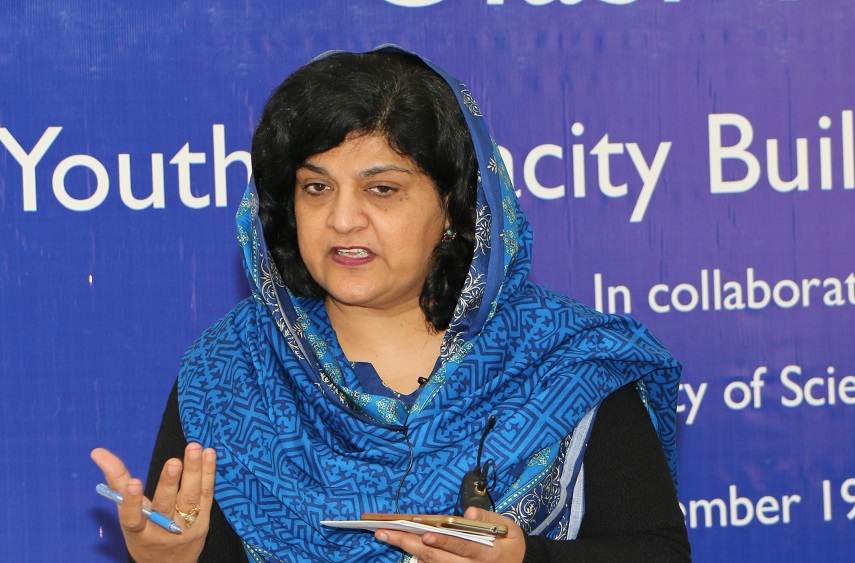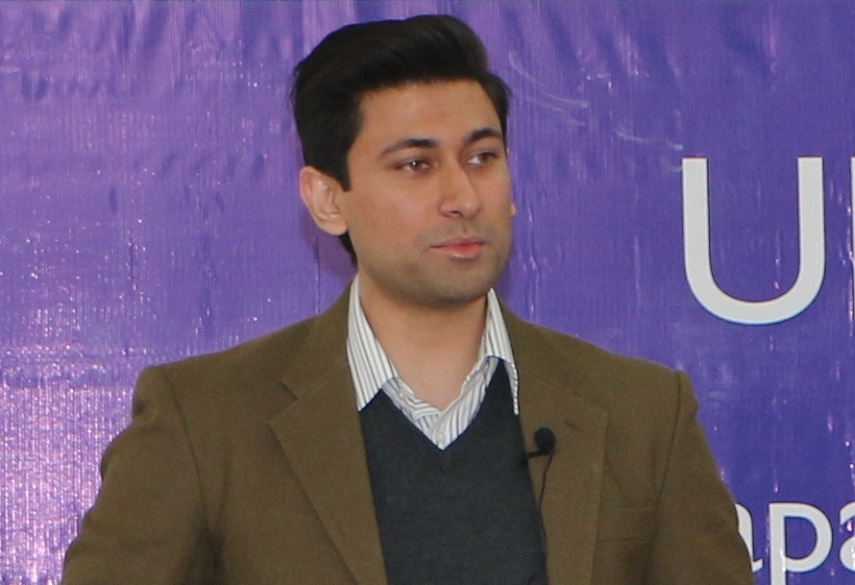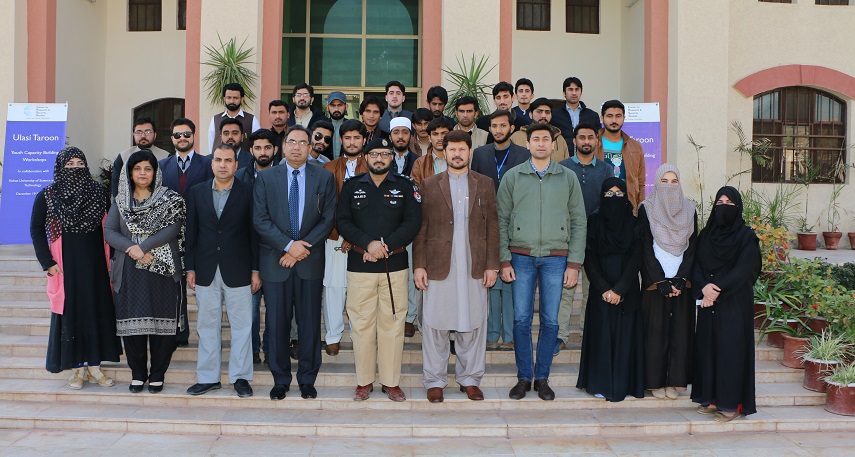The primary role of police is crime control through prevention and detection and looking after the law and order in the society. Without the support of public, no police can ensure smooth implementation and rule of law. The public should believe in and practice responsible citizenship; considering the cooperation aspect of their partnership with police and the security agencies as primary public responsibility to uphold rule of law. The public-police relationship ought to be characterized by mutual trust, respect and cooperation; the ingredients fundamental to not only rule of law but also the social cohesion.
These were the remarks made by Mr. Wahid Mahmood, District Police Officer (DPO), Kohat during the thirteenth round of Ulasi Taroon, Youth Capacity Building Workshops organized by the Center for Research and Security Studies (CRSS) at the Kohat University of Science and Technology (KUST) from December 19 – 20, 2018.
He said that bridging gaps between the public and police can strengthen rule of law in Khyber Pakhtunkhwa; where the tools introduced as part of KP Police reforms such as Police Access Service and Police Assistance Lines (PAL) – just to name a few – are some significant interventions to strengthen this relationship and create linkages critical to foster mutual trust and cooperation mechanism for a peaceful society. This means that the public must report information about crimes to the police as responsible and proactive citizens.
Rule of law is within ourselves; our ethics and values that govern our actions. The youth, in order to achieve success, needs to nourish their minds with positivity as a prerequisite for positive thoughts, words, actions, habits and characters; as the quality of character makes the quality of success in life. He said that the peace lies within patience and tolerance. The highest form of the strength is forgiveness and highest form of the weakness is revengefulness. The real benchmark of success is our ability to respect people regardless of their backgrounds. This will not only ensure inner peace but will also contribute to social peace and harmony. The youth should always be willing to go an extra mile as it is one of the fundamental qualities of leaders.
Dr. Hidayat Ullah Khan, KUST, said that research dictates that the socio-political progress and economic development are directly proportional to the quality of democracy, governance and accountability. All these milestones besides international cooperation require inclusive democracy, good governance and across the board accountability. These are all the ideals – embedded in and stressed by the constitution – which are necessary to restore public’s trust and uphold rule of law. Only a democratic system of governance can ensure the allocation and distribution of resources on the basis of ideals of equity.
Dr. Mohammad Tariq Jan, Director ORIC, KUST said that The youth – as future leaders – should realize the importance and message multiplication and dissemination and thus – attempt to educate the member of society within their social and professional spheres in the core constitutional values critical to social cohesion and harmony.
Mrs. Shagufta Khalique, educationist, said that rights and responsibilities are inter-connected. Educating public on the rights and responsibilities anchored in their constitution as well as the international commitments like UDHR is absolutely necessary for social cohesion and peace. The Constitution of Pakistan provides guidelines and basic principles for equal citizenry, however, the role of youth in promoting these ideals of equality and tolerance is direly needed to minimize human rights violations in the society. Respecting and practicing these ideals will result in a fair and transparent society. Once the diversity and differences are accepted in a society, the ultimate result is peace. The first step is to have a holistic and inclusive approach at the individual level and a positive response to the diversity around. She added that at the core of democratic government is accountability. Good governance means across the board the accountability and balance of powers. Democracy is also an attitude that needs to be inculcated among youth with practical examples.
“Conflicts do exist and are permanent; however the negative impacts can be reduced by using different conflict resolution techniques. We must understand that dialogue is the key to resolve the disputes and differences rather than force or coercive means”, Shagufta concluded.
Mr. Shams Momand, Project Manager, CRSS spoke about the role of media including broadcast, print and social media to counter radicalization and disseminate the positive messages and tolerance perspectives. It’s an avenue worth tapping into given its tremendous outreach to strengthen social cohesion and cultivate the public in its core values. The youth should positively use this platform to spread the messages of peace and harmony.
Mr. Malik Mustafa, Manager Programs, CRSS said that the society devoid of disparity, distinction, discrimination or any other divisive factors which engender divisions, distrust and conflict is known as a cohesive society. Social cohesion helps people to work together for the attainment of shared goals, designed and agreed upon to improve the living conditions for all. It ensures greater inclusiveness, more civic participation and creating opportunities for upward mobility. It is the glue that holds society together.
Ulasi Taroon is a counter radicalization initiative of CRSS that aims to address the radicalization challenges, extremist ideologies and foster social cohesion through a discourse anchored in the core constitutional values which are fundamentally essential prerequisites for social peace and harmony. The endeavor aims to cultivate and sensitize the youth – in the universities across KP – in the core values in the Pakistani constitution and our social contract. It’s an attempt to highlight the criticality of abiding by these ideals – such as adherence to rule of law, primacy and sanctity of constitution, equal citizenry, responsible citizenship, respect for fundamental human rights, tolerance for diversity and different opinions, inclusive democracy and good governance – as a measure of fostering social cohesion and peaceful co-existence.

